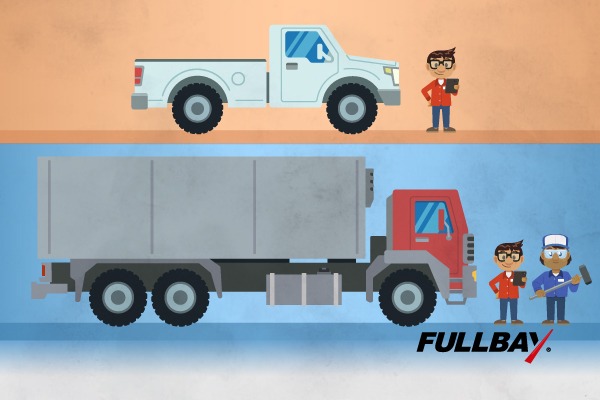The Good, The Bad, and the B2B!

Are you a B2B or a B2C shop? Quick, answer now!
Did you have to think about it? That’s all right. We asked you that question to give you something to gnaw over while we lay down a few explanations.
B2B means “business to business.” If you’re mostly servicing vehicles that earn money for their owners, you’re a B2B shop.
B2C means “business to customer.” If you’re mostly servicing privately owned vehicles that are used for getting around and not to earn income, you’re a B2C shop.
We’ve noticed something, though. “B2B” seems to be a hallowed status, one spoken of in whispers by owners who see themselves as strictly B2C. Their idea of a B2B shop is a sprawling, state-of-the-art complex run by robots, where everything is shiny and computers are calling the shots.
That’s not the case. If you’ll excuse the reference, B2B is about your clientele, not necessarily you. And if you want to get into the B2B trade, you can.
Actually, you might already be in it.
Fullbay CEO Jacob Findlay has a story he likes to tell about a conversation he had with a shop owner. They were chatting about operating a B2C business when the owner mentioned he also serviced the fleet vehicles belonging to a company down the street.
“Then you’re B2B,” Jacob said.
The shop owner mulled over that one for a while.
We often mull over it here at the Fullbay office. Can you be B2C and B2B? Should you be? What are the upsides and downsides?
We eventually cornered Jacob in the kitchen and refused to let him finish his scone until he told us more about breaking into the B2B field — and how to determine if you already have.
ARE YOU A B2B SHOP?
Are any of your customers businesses?
Stop and think about this one for a minute. If you consider yourself a regular B2C shop, then the vast majority of your service is performed on vehicles owned by individuals. They’re being used for transport.
Or are they? If you’re seeing pickups carrying their owner’s branding, you’re probably seeing business vehicles. Think a little more. The shop owner in Jacob’s story thought he was just looking after some trucks — but those trucks were owned by a business. If you’re looking after vehicles that earn money somehow, you’re a B2B shop.
Do any of your customers have a large number of vehicles?
By their very nature, B2C shops are based on quick turnaround. Cars need to be in and out the door ASAP so customers can get back to their lives. Often you don’t see the same person twice in a week or a month, because they only have one vehicle.
If you’re seeing the same name and face pop up over and over again — attached to different vehicles — you might well be seeing a business owner and their fleet.
Are you tracking PMs?
The best way to keep a vehicle running and profitable is to fix problems before they start — or at least before they become bigger problems. Provided a shop has the right software and tools to handle PMs, it’s often more convenient for a fleet manager to bring their trucks to the nearest shop instead of trek out to the manufacturer.
If you’re tracking the preventive maintenance of some customers, take a look at their vehicles. If they’re a business, congratulations! You’re doing B2B work.
SHOULD YOU DO MORE B2B WORK?
We thought you might ask us that. If you’re still not sure you want to stick a toe further into the waters of B2B, we’ve assembled some extra information for you.
B2B shops tend to make more money
Money. We all love it, even though sometimes we pretend not to. Repairing cars for regular customers can be tricky; the average customer is just as crunched for cash as you are, and you have to price parts and labor in a way that gains you a profit without completely being out of reach of the customer.
All too often, this leaves you making what seems like fifty cents on a thousand-dollar job.
In the B2B world, repairs are more straightforward. Any owners you encounter “are probably making money with that truck,” Jacob says. When you tell a truck owner or fleet manager that certain repairs are going to cost a certain amount, they have to figure out, “Does the pain of not having this unit in service outweigh the pain of paying for the repair?”
To the surprise of absolutely no one, most businesses want that truck on the road, making money for them. They’ll be happy to pay the price you quote to make that happen.
B2B business runs a little smoother
We’ve all been in that awkward spot. Our car made a weird sound, we brought it to the shop, and the sheepish mechanic announced that it would take a few grand to get the vehicle back in running order (and maybe make it safe). This almost always turns into some sort of emotional moment; you might see a grimace, teeth-gnashing, or even tears, depending on the customer. It’s a financial hit.
You don’t see that kind of reaction very often in the B2B world.
Most often they just want their vehicle back on the road earning money for them, and they’ll authorize the repair. Everyone knows what’s going to happen; you schedule the service, order the parts, and get things underway. “The emotion,” Jacob says, “is drained from the situation.”
SO AM I B2B OR NOT?
The secret’s out: jumping into the B2B world can be lucrative, and it doesn’t need to involve a complete overhaul of your shop and staff. You might already be doing some B2B work and just not have realized it.
The thing about running your own shop is you don’t have to pick one side or another. You can mix B2B and B2C, setting particular rates for your business clients and others for your retail crew. Do what’s right for you and your shop.
If you already had B2B customers and are realizing there’s more you can do with your shop, then we’d say our work here is done. And hey, if you do decide to take on B2B work that happens to be heavy-duty, we do recommend a certain software that’s great for tracking PMs.

